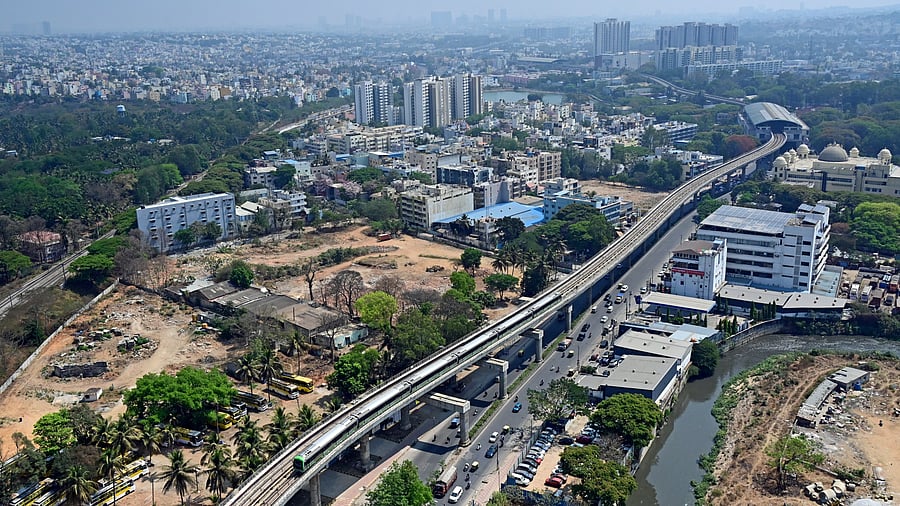
The GBG Bill of 2024 proposes the creation of no more than seven city corporations along with an apex body called the Greater Bengaluru Authority. DH FILE PHOTO
Credit: DH File Photo
Bengaluru: The BBMP’s budget for 2025-26 has set aside a hefty Rs 2,144 crore for establishment and administrative expenses, making up around 11 per cent of the total outlay. Now, if the Greater Bengaluru Governance (GBG) Bill gets the green light, some urban experts fear that this number could skyrocket without any guarantee of tangible improvements on the ground. In fact, the situation might deteriorate, they caution.
The GBG Bill of 2024 – which awaits the assent of Governor Thaawarchand Gehlot – proposes the creation of no more than seven city corporations along with an apex body called the Greater Bengaluru Authority (GBA). This body will oversee and coordinate development activities across various parastatal agencies. Headed by the Chief Minister of Karnataka, GBA is a superficial replica of the Greater London Authority.
But here’s the catch: running these new corporations isn’t going to be cheap.
Beyond the administrative costs, managing an independent municipal corporation will demand additional manpower — engineers, support staff, and dedicated wings such as legal cells, technical vigilance units, and quality control departments. The Bill suggests that each corporation will cover no more than 150 wards, meaning a significant chunk of revenue will be allocated to meet councillors’ demands, from medical expenses to official vehicles. Additionally, pensions and other employee benefits will further strain the budget.
Proponents of the Bill, however, argue that while administrative costs might rise by around Rs 100 crore annually, the investment is justified as it will bring the city government — or municipal corporations — closer to the people.
V Ravichandar, a member of the Brand Bengaluru Committee mentioned that they estimate the need for only about 50 additional staff members, as the current officers are largely sufficient to manage three to five smaller corporations.
“Some zonal offices are large enough to be converted into corporation headquarters where council meetings can be held,” he explained. He emphasized that the true measure of success lies in the corporations becoming more accessible to citizens. “There will be political decentralisation. Just speak to the people of Mahadevapura — they’re excited about the idea,” he added.
Limited role
While smaller corporations are closer to the people, their role is likely to be limited. This is largely because the state government has already delegated key municipal functions to independent entities such as Bengaluru Development Authority (BDA), Bengaluru Water Supply and Sewerage Board (BWSSB), and Bengaluru Solid Waste Management Ltd (BSWML). Additionally, the formation of Bengaluru Smart Infrastructure Ltd (B. SMILE) is underway to manage large-scale projects.
These Special Purpose Vehicles (SPVs) are poised to play a significant role in Bengaluru’s governance, as reflected in the BBMP’s recent budget, which allocated substantial funds to organizations like B. SMILE (₹6,000 crore) and BSWML (₹1,400 crore). In the future, BBMP is also expected to lose jurisdiction over stormwater drains and major roads that span multiple corporations.
Largely dependent on property tax, the proposed ‘smaller corporations will have limited resources to undertake major projects. Their budgets will mostly focus on maintaining existing infrastructure like parks, streetlights, and ward roads.
The notion of smaller corporations, supported by a central governing body, has found favour with Alok Prasanna, co-founder of the Vidhi Centre for Legal Policy and Srikanth Viswanathan, CEO of non-profit Janaagraha.
“While there’s a strong emphasis on grand infrastructure projects like ring roads, flyovers, and tunnels, the quality of everyday neighbourhood amenities — like parks, footpaths, and streetlights — is declining. Smaller corporations could bridge this gap by offering more effective, localised service delivery,” Viswanathan noted. However, he did not support the CM leading the GBA, arguing that it should be headed by a directly elected mayor.
Prasanna pointed out the shortcomings of the 74th Amendment to the Constitution. “It’s not equipped to tackle the unique challenges of sprawling cities like Bengaluru. Smaller, more localized corporations are better suited to manage the complexities of urban governance,” he added.
Padmanabh Reddy, a former councillor, however, opined that neighbourhood issues could be better addressed by creating smaller wards in areas such as Mahadevapura, Bommanahalli, or RR Nagar, rather than splitting the BBMP. “These works are attended to by councillors and ward engineers,” he noted. He also pointed out that both the Chief Minister and Deputy Chief Minister could already hold coordination meetings with different bodies, making the formation of a separate body unnecessary.
Echoing the same, R. Rajagopalan, convener of Bengaluru Coalition, argued that the creation of smaller corporations would not bring any real change unless the Bill ensures accountability among officers, engineers, and MLAs.
“The BBMP is a rotten basket of eggs. Whether we create three or five baskets, it won’t make a difference. Corruption, lack of transparency, and absence of accountability are the root causes of administrative failures. Without tackling this, there won’t be any fundamental change,” he said.
The government, he said, should consider establishing SPVs to address critical concerns — such as enforcing building regulations and maintaining walkable footpaths, which would contribute to an improved quality of life in Bengaluru.